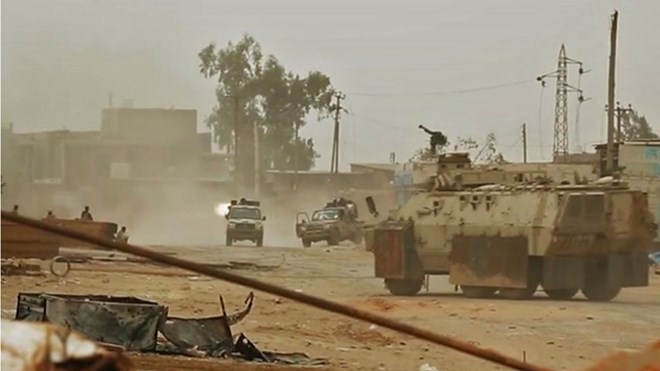
Friday April 26, 2019

LNA War Information Decision, AFP | Screengrab from a video published on the Libyan strongman Khalifa Haftar's self-proclaimed Libyan National Army (LNA) War Information Division's Facebook page on April 24, 2019.
Intensified fighting for control of the Libyan capital is turning residential areas of Tripoli into "battlefields", the Red Cross said Thursday, amid a row over France’s alleged backing of military strongman Khalifa Haftar.
"The humanitarian situation in and around Tripoli has deteriorated sharply over the past three weeks," since Haftar launched an offensive on April 4 against forces loyal to the internationally-recognised Government of National Accord (GNA), the International Committee of the Red Cross said in a statement.
"More than 30,000 people are said to have fled their homes and are sheltering with relatives or in public buildings," it said, a figure which Libyan authorities and the United Nations say has risen to almost 35,000.
"Tripoli's basic services and infrastructure, such as hospitals and water pumping stations, which have already suffered from violence over the past eight years, are being weakened further," it said, referring to the insecurity in Libya since the 2011 uprising that ousted dictator Muammar Gaddafi.
Youness Rahoui, the head of office in Tripoli for the ICRC, singled out the impact of the violence, which has focused on Tripoli's southern suburbs, on residents of the capital.
"One of our greatest concerns is for civilians living near the frontlines. Densely-populated residential areas are gradually turning into battlefields," Rahoui said.
He also said it was becoming "increasingly dangerous for medical workers to retrieve the wounded, with mounting reports of indiscriminate shelling".
At least 278 people have been killed and more than 1,300 wounded in the clashes, according to the latest casualty toll from the World Health Organisation.
GNA leader excoriates France for ‘supporting a dictator’
The Red Cross’ announcement comes after Fayez-al-Sarraj, the head of the GNA, lambasted France on Wednesday for supporting Haftar, who has carved out a de facto state in the east of Libya.
Sarraj denounced Paris for backing a "dictator," in his harshest criticism yet of French diplomacy, in an interview with left-wing French daily Libération.
"We are surprised that France does not support our government that is democratic, but supports a dictator," Sarraj continued.
"When Emmanuel Macron called me, I warned him that public opinion was against France. We don't want Libyans to hate France. France still has a positive and important role to play," he said.
In a separate interview with the Le Monde on Monday, Sarraj said France was partly to blame for Haftar's offensive on Tripoli.
"The disproportional support from France towards Haftar is what made him decide to take action and abandon the political process," he said.
Although it has long been suspected of backing him, France publicly denies supporting Haftar. It says it has contact with all the actors competing for advantage in Libya.
‘A looming banking crisis’ for Haftar
One way in which militias are jostling for hegemony relates to money. Indeed, the outcome of Haftar’s offensive on Tripoli could be determined by a separate battle -- to keep open the parallel finance system that funds his soldiers.
The general has funded his eastern state with a mix of unofficial bonds, Russia-printed cash and deposits from eastern banks, accumulating debt worth around 35 billion Libyan dinars ($25.18 billion) outside the official banking system.
But diplomats and banking sources say that those sources of support might be closing, as the Tripoli-based central bank, which controls the country's energy revenues, has taken steps to curtail the operations of banks in the east.
Those banks have in recent months struggled to meet minimum deposit requirements, which could give the Tripoli central bank allied to Tripoli Premier Fayez al-Serraj the excuse to shut off access to hard currency, they said.
"There is a looming banking crisis that could undermine eastern authorities' ability to fund themselves in the near future," Claudia Gazzini, senior Libya analyst at International Crisis Group, told Reuters.
"The crisis was already in the making before the war broke out," she continued.
(FRANCE 24 with AFP and REUTERS)